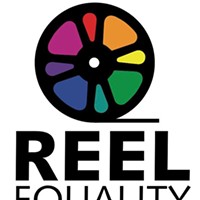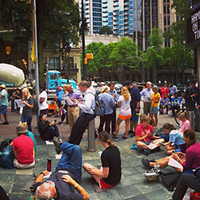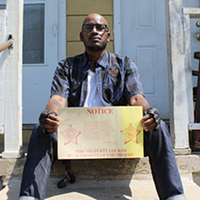Charlotte ink
Behind the pain with a trio of the Queen City's finest tattoo artists
By Cheris HodgesPage 3 of 4
"Actually, I think he's more gentle than I am," she says she told the client.
Being a woman can also make clients feel a little looser.
There was the time when a woman entered the shop, walked over to Hagy, dropped her pants, opened her legs and said she wanted a star tattooed on her crotch.
"I said: 'Wow, I need a cigarette,'" says Hagy, who -- at the time -- left the studio to go take a smoke.
While she went ahead and did the tattoo for the woman, it's not something she wants to experience again.
"I don't think I want to tattoo another crotch," she says with a slight shudder.
"There are too many shops that are ... just in it for that quick dollar."
Billy Harris is thankful for crazy friends. Friends who allowed the art major to test his tattooing skills on them as he began his apprenticeship at Alternative Arts studio on Central Avenue.
Harris went on to become the first African-American tattoo artist to get apprenticed and a tattoo license in Charlotte. That was 12 years ago.
"I was in college, and I was getting a degree in art. I'd come to get a tattoo from John Rainey, and back then there were about five tattoo shops in Charlotte," says Harris. "Probably two or three really good ones."
Harris and Rainey struck up a conversation and Rainey asked him to bring in his portfolio. At the time, Harris says he wasn't really that interested.
"At that time, there wasn't a lot of black people getting tattoos [or] doing tattoos for that matter," he says. But Harris decided to test it out. He returned to the shop and started hanging around.
"I started liking the atmosphere, and what I started seeing ... was that more and more African-Americans were starting to get tattoos, but they really had no where to go to."
It never really dawned on Harris that he was making history, and he doesn't dwell on it.
Harris says the older artists who were more used to tattooing white biker dudes didn't really know how to work with black skin. "They think the deeper they go, the darker the ink is going to get. Not knowing skin types, they didn't realize that the darker complexion you are, the softer your skin is and you have to use a different technique.
"Also, the darker [your] skin ... the more likely you are to keloid. I noticed that a lot of people were leaving these tattoo shops around here with keloid scars that were supposed to be tattoos. I kind of got into it thinking that I could offer black folks a better alternative at the time."
Harris says he fell in love with the art form and began researching it to learn as much as he could to advance his craft. In the beginning, it was hard for Harris to even hold the vibrating tattoo machine in his hand for longer than 15 minutes without his hand going numb.
"Now, I can tattoo all day and be fine," he says. "I think the first paid tattoo that John actually let me do, somebody came in and wanted a little cherry. But by the time I got finished with it, it looked like a big ass apple. She was happy and satisfied with it, but I knew I could do better. I just needed a lot of practice."
At one point, Harris and a partner opened their own shop. It has since closed because Harris says he and his former partner had different ideas on how to run the business. Since he was working at Winthrop University building Web sites in the school's university relations department and wasn't in the shop every day, he says his partner's business plan was the one being used.
When he was at the school, Harris did all that he could to hide his tattoos at first. He thought being in a place of higher learning and being heavily tattooed would cause problems for him at the workplace. So for a long time, he covered his arms year-round with long sleeve shirts. In the heat and humidity of the Carolinas during the summer, that wasn't always the most comfortable thing. But, he says, once students found out that he was a tattoo artist, the phone at his desk started ringing off the hook.
For Harris, the relationship between artist and client is a special one. The artist creates a piece of work that will be with a person forever (or until they get it lasered off).
"I do appreciate how tattooing culture is on TV and more popular, but at the same time, it's causing more people to get into it that have no business in it. Because they are seeing it on TV, they think, I can make a lot of money and meet hot girls. If you're not in it for the love of the art, you need to get out of it. There are too many shops that are open now that are just in it for that quick dollar."
Latest in Cover story
More by Cheris Hodges
-

Statewide film series set to fight N.C. anti-gay amendment
Dec 15, 2011 -

N.C. governor vetoes repeal of Racial Justice Act
Dec 14, 2011 -
More Democratic in-fighting
Dec 13, 2011 - More »
Calendar
-

NEW WINDOW GALLERY-Pat Rhea-ACRYLIC PAINTINGS-April 05-30 2024 VALDESE, NC 28690 @ New Window Gallery/Play It Again Records
- Through April 30, 12 p.m.
-
Derek Hough - Symphony Of Dance @ Ovens Auditorium
-

"Blood Residue Analysis of Paleoamerican Stone Tools in the Carolinas" @ Native American Studies Center
- Fri., April 26, 12-1 p.m.
-

ARTS RENAISSANCE, a GALA supporting the ARTS in South Carolina @ the Columbia Museum of ART
-
 The Piano Guys @ Ovens Auditorium
The Piano Guys @ Ovens Auditorium
-
The death of CAST 5
What really happened to Charlotte's beloved experimental theater company?
-
Jessica Moss Makes the Gantt Center a Safe Zone for Local Artists 2
Flipping the script
-
Charlotte ink 7
Behind the pain with a trio of the Queen City's finest tattoo artists











